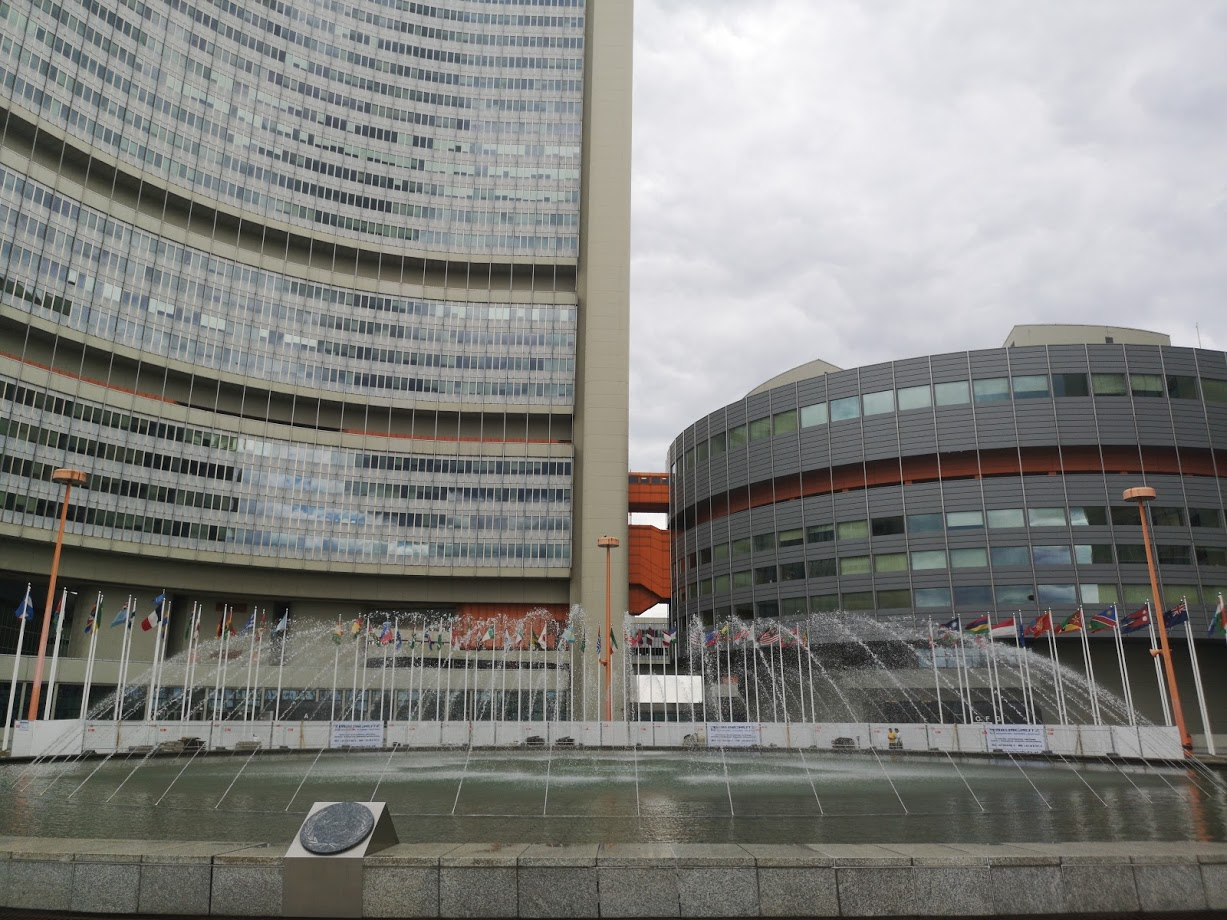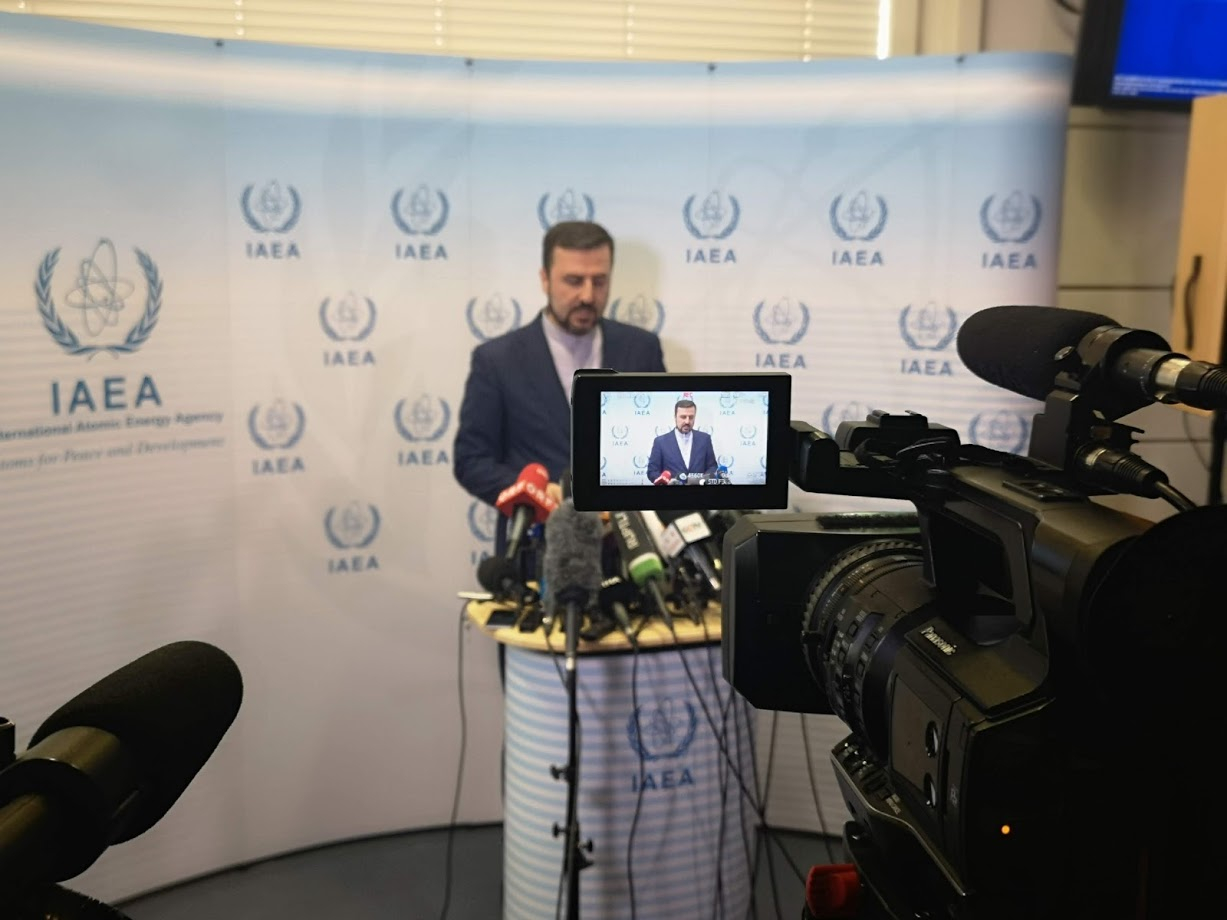
I remember coming to Vienna back in 2014 to cover the negotiations between the P5+1 countries (China, France, Russia, the United Kingdom, the United States, and Germany) and Iran about its then-controversial nuclear program.
Those efforts paid off a year later when all seven countries signed the Joint Comprehensive Plan of Action (JCPOA).
But here we are, four years later and the heavily negotiated deal has almost collapsed.
The Trump administration has been very critical of the agreement ever since coming to power in 2016 and subsequently withdrew from it. Washington also re-imposed crippling economic sanctions on Iran.

The IAEA headquarters in Vienna on July 10, 2019. /CGTN Photo
Earlier this month, the United States called for an emergency meeting with the board of governors of the International Atomic Energy Agency (IAEA) one day after Tehran announced they had exceeded the agreed limit of 300 kilograms of low-enriched uranium agreed under the 2015 nuclear pact.
A few days later, IAEA inspectors confirmed the news, along with Tehran's announcement that it had enriched uranium past the accord's 3.67 percent purity limit.
The U.S. Ambassador to the IAEA, Jackie Wolcott, opened the meeting by stressing Washington's grave concerns.
"Iran's past pursuit of nuclear weapons — and its well-documented efforts to preserve and conceal information from its prior nuclear weaponization work — heightens the seriousness with which we and the international community should view these recent developments."
She also accused Iran of "nuclear extortion" by not adhering to the nuclear agreement in an effort to gain economic compensation for the sanctions that effectively cut Iran off from its main source of foreign revenue — crude oil exports.
Washington accuses Tehran of violating the terms set out in the JCPOA.
Yet Iran, and other signatories, say it has not.

Iranian IAEA representative Kazem Gharib Abadi speaks during a news conference after a board of governors meeting at the IAEA headquarters in Vienna, Austria, July 10, 2019. /CGTN Photo
Following the four-and-a-half-hour closed-door meeting, the Iranian IAEA representative, Kazem Gharib Abadi, spoke to us journalists, calling the U.S. "economic terrorists" for reimposing the sanctions.
Abadi said the meeting, called for by a "regime" that had "violated all its own commitments and unilaterally left the agreement," is a "sad irony."
China agrees.
I spoke one-on-one to the head of the Chinese delegation, a cheerful man named Fu Cong, who is the director general of the Firearms and Disarmament Department of the Foreign Ministry. He told me that Beijing is saddened by Iran's decision to exceed the terms of the agreement but also believes they were put in that position by the imposition of the U.S. sanctions.
Tehran is also frustrated by Europe's inability to soften financial losses and provide enough economic incentive to stay in the deal.
While the E3 signatories — France, Germany, and Britain — have come up with a financial mechanism to skirt the sanctions, it's not wide-reaching enough to satisfy Tehran.
The U.S. has offered another accord that not only includes its terms to the nuclear agreement but also adds in restrictions on Iran's ballistic missiles and regional behavior.
Tehran has scoffed at that.

A general view ahead of the start of a board of governors meeting at the IAEA headquarters in Vienna, Austria, July 10, 2019. /VCG Photo
So here we are.
The hard-line, all-or-nothing approach of the Trump administration seems to be having the opposite effect on Iran, and other signatories, than expected.
Tehran insists it has no desire to build a nuclear bomb and is simply arguing its right to the same economic environment and nuclear energy capabilities as other countries.
Yet such war of words and bravado are increasing tensions quickly with fears they could escalate into an all-out war.
Iran may still be well below the 90 percent purity level needed to make a nuclear weapon, but that concentration can quickly be reached once uranium is enriched to 20 percent.
And that is exactly what Tehran is aiming for — the percentage they enriched prior to the deal — which would technically bring us back to where we started.
(Cover: Iranian IAEA representative, Kazem Gharib Abadi, speaks during a news conference after a board of governors meeting at the IAEA headquarters in Vienna, Austria, July 10, 2019. /CGTN Photo)

Copyright © 2018 CGTN. Beijing ICP prepared NO.16065310-3
Copyright © 2018 CGTN. Beijing ICP prepared NO.16065310-3